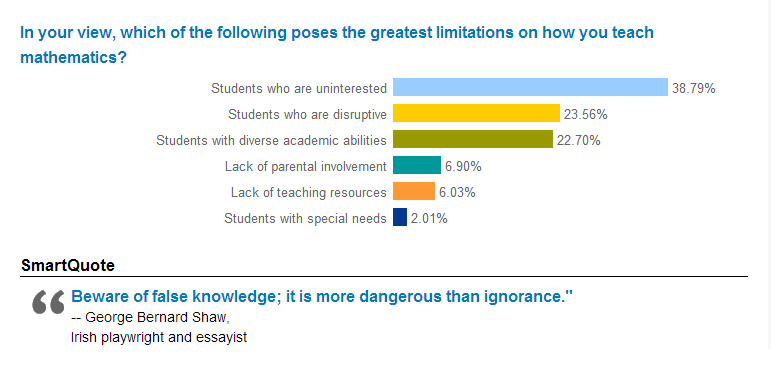
Source: NCTM Smartbrief
It seems to me that "students who are uninterested" is a problem of pedagogy. If that is what is holding students back from learning mathematics, then you should make your lessons more interesting. "Students who are disruptive" seems like another way of phrasing the first problem, but having worked in a challenging school myself, I do remember students who were challenging no matter how much I stood on my head to make my lesson interesting. That being said, both of these challenges are significantly less with good teaching. Students who are uninterested in what you teach are a sign that you should change your approach.
"Students with diverse academic abilities" is a serious problem, but it is (at least in part, see below) solvable. The basic trick is this, don’t teach everyone the same thing at exactly the same time. I would approach this particular issue with low-entry / high ceiling problem solving activities in small groups and then I workshop solutions with individual groups as I move around the classroom.
"Lack of a parental involvement" is definitely a huge issue. I think if you have interesting lessons and develop positive relationships with your students though you can mostly counteract the effects of parental apathy. My objective here is to set high standards for my students and their relationship with math like what I have for my own son.
"Lack of teaching resources." Uh… Have you heard of the Internet? Being a part of the Math Twitter Blogosphere means that lack of resources is never a problem. In fact, more resources than I can possibly use is more frequently the problem. Edit: It occurred to me that this may mean lack of physical resources, like pencils and paper, etc… in which case someone, somewhere, needs to rethink the priorities for their schools. Teachers and students should not lack for basic supplies.
For me the "students with special needs" problem can partially be addressed with using a problem solving approach with media that asks questions (like what Dan Meyer is curating with 101qs.com) for students for whom literacy is their barrier to mathematics. However, students with dyscalculia or who are many, many grade levels behind in their understanding of mathematics probably need more support. Having worked in a school that had minimal support for students with special needs many years ago, I definitely empathize with people who see this as a problem.
The thing is about all of these responses is that not one of them is how I would answer this problem. For me, the things that I feel impose the greatest limitations on how I would teach (and most importantly, what I would teach) are the standards we are assigned to teach and the way students will be eventually externally assessed on those standards. I can certainly still teach in a creative way given these limitations, but they definitely place limitations on how I teach.
John Spencer says:
I think my two biggest barriers have been the standards (I’m with you there) and my own areas of weakness. Math is my weakest area as a teacher, because I struggle with how to keep LCM and GCF relevant. I am still working on how to organize things thematically. I screw up by adding manipulatives that I think will help and then only hurt. So, it’s a bit of the outside and a bit of my own weakness.
July 5, 2013 — 11:56 pm
Lucas Corwin says:
Thanks for this post David. I’ve followed you on twitter for couple of years and appreciate your insights. On the problem of students who are uninterested, what can a parent do to help get their children interested? This is a struggle for us every Fall.
July 6, 2013 — 2:16 am
David Wees says:
Without knowing your child, I do not know what will work for them. I can only speak to what has worked with my son. Here is a description of some of the things my wife and I do with him to promote his interest in mathematics. Next, I often find some children dislike things in which they are under pressure to perform (unless they have chosen to do that activity) and so you may want to find a way to promote growth without too much pressure. It’s kind of like saying ‘look at how much you have improved" instead of "look you got an A." The first measure is against themselves, the second measure is against their peers.
You could also join a local math circle with your son, although they do not exist everywhere. I’d also recommend looking at some of Vi Hart’s videos so you can get a sense of how differently people can define the discipline of mathematics.
July 7, 2013 — 9:49 am
Earl Samuelson says:
I agree entirely that bringing up grades can be damaging. Focusing on a particular “grade” will put unnecessary pressure on a young student; this may ultimately lead to feelings of inadequacy if not attainable (and eventually hopelessness). I also agree with not “forcing” or pushing young children to “learn” something if they are not ready or willing (there is no bigger turn off than this). Children are naturally curious. It’s important to use opportunities when questions are asked by children to satisfy their curiosity and give them other things to ponder. This can go on and on but it is very important to end the activity when interest starts to wane. “Leave them wanting more”.
July 7, 2013 — 10:08 am